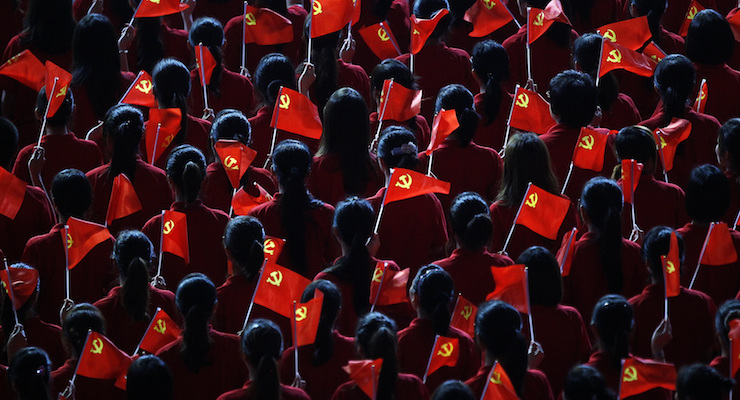
According to some breathless headlines in The Australian, communists are now “infiltrating Western consulates”.
News Corp’s Sharri Markson has gotten her hands on a leaked dossier of 1.95 million Chinese Communist Party (CCP) members. Some of these members, she says, are working in the Australian and British consulates, others at big companies like ANZ and Boeing.
If it sounds scary, that’s because it was designed to. But like so many Markson bombshells, it promised so much and delivered little. Instead, China experts say the article is a beat-up, taking a benign and well-known reality of working in China and spinning it as a national security risk.
A red scare?
The Australian‘s big claim, that CCP members are working at consulates and businesses in China, isn’t exactly new.
“Having CCP members in, for example, big companies, is quite usual and has been the practice for a long while, and doesn’t necessarily indicate any influence,” says China Policy Centre director Yun Jiang.
“A lot of those CCP members aren’t part of the politburo, they’re just rank-and-file members.”
James Laurenceson, director of the University of Technology Sydney’s Australia-China Relations Institute, says the latest article is a beat-up, taking well-known issues and framing them as a kind of “red scare”.
Given there are some 95 million CCP members in China, it seems inevitable that a few might wind up working for foreign companies, or as locally-engaged embassy staff. Of course, not every CCP member is a potential spook, or even a hardcore ideologue.
“The main reason people join the CCP is it helps advance their own networks and career prospects,” Laurenceson says.
That reality of operating in China is something the Department of Foreign Affairs and Trade is no doubt aware of, telling The Australian its security and hiring arrangements were “robust”.
Is there a real espionage risk?
Even if the existence of CCP members in foreign companies and consulates is benign and normal, should we be worried? Well, not even The Australian is able to make the “infiltration” argument clearly.
“There is no evidence anyone on the membership list has spied for the Chinese government,” Markson writes halfway through the piece, despite strongly suggesting the complete opposite.
The most damning claims of potential espionage risks are made by a series of anonymous intelligence sources. The article also claims that “experts” suggest these groups could be operating as a “spy-ring”.
The only named expert who made that claim to the Oz is Samuel Armstrong, a fresh-faced British Conservative Party apparatchik who does communications for the Henry Jackson Society, a hawkish foreign policy think tank. Armstrong also works for the Inter-Parliamentary Alliance on China, the group of anti-Beijing politicians who gave the dossier to the Oz.
According to Jiang, the article simply reinforces existing beliefs about the CCP and its infiltration in Australia. “Even with very flimsy evidence, articles like this get a lot of media attention,” she says.
Foreign Policy deputy editor and China expert James Palmer is more blunt: “[it’s] paranoid, red-baiting bullshit”.
The cost of sensationalism
But Markson’s piece is just another example of the kind of sensationalised China coverage that’s becoming increasingly common in Australia.
“There’s been some really good media reporting on untoward CCP interference in Australia,” Laurenceson says. “But this does continue a trend to sensationalism on China, and the latter absolutely has the ability to do massive damage to a relationship that is of important benefit to Australia.”
Jiang worries insinuating that anyone with party links is a spook could further the climate of suspicion toward Chinese Australians we’re seeing back home.
“What comes out of these stories is people of Chinese heritage, or even people with Asian heritage in general can often be falsely accused of espionage and nefarious intentions.”








I have an exclusive for Crikey that you can give the headlines it deserves: There is strong evidence of committed Catholics working in Australia’s embassy to the Vatican. No direct evidence has come to light, yet, that they are spying for the Vatican authorities but you can’t be too careful when dealing with a State that has no popular elections.
Which is a change from the old days ‘Rats’ when our Ambassador (usually resident in Dublin) could not be a Roman Catholic!!!
Typical MSM stunt. They’ll be telling us bears do number twos in the woods next.
I thought that’s what the Pope does?
So allegedly the CCP is planting its members in positions where they might help the party in its aims. Where might it have got this idea? Has it been watching the Australian Liberal and National parties stuffing their cadres, has-beens, failures, leftovers and general party detritus onto ostensibly independent boards and agencies, diplomatic postings and various other cosy sinecures or positions of influence?
Once again, as with tariffs, there is a strong whiff of do as I say, not as I do.
On that subject, Rat, I recommend hopping over to Giles’ place (Renew Economy) and cottoning to the RBA’s ‘decision making process’ involved in buying energy to ‘power’ the institution.
Ah, Sharri Markson: Brynne Edelsten without the wit, talent, or news sense.
http://andrewelder.blogspot.com/2014/08/a-modest-proposal-for-newscorp.html
I would have thought that a genuine spy would NOT be a member of any thing that may shine a light on their intended purpose. Drrrr
Which major country doesn’t have spies?
Australia used spies in East Timor for financial advantage … has the Australian ever complained about that?
Not while Alexander Downer is still thieving oxygen, they won’t.